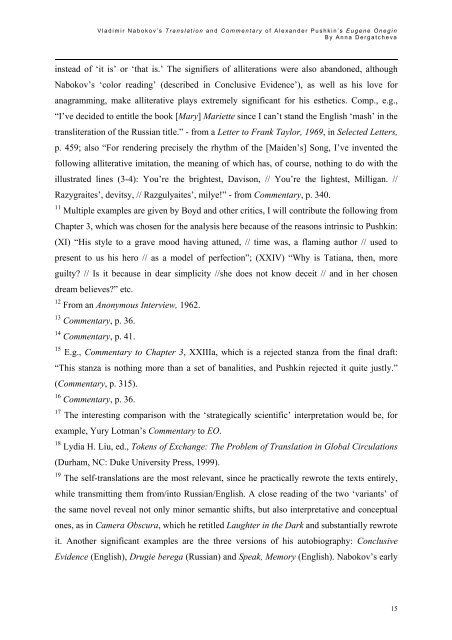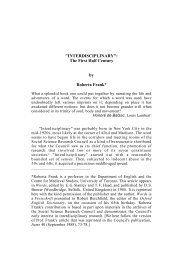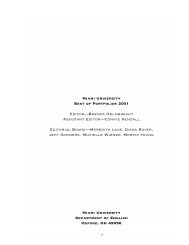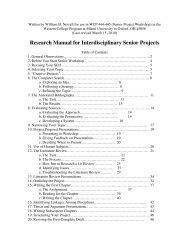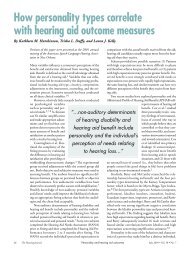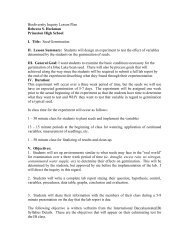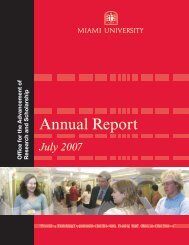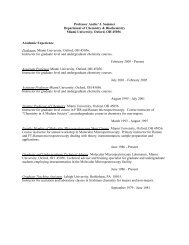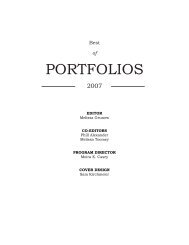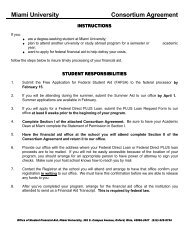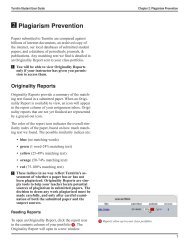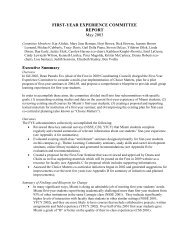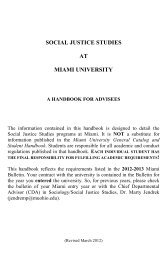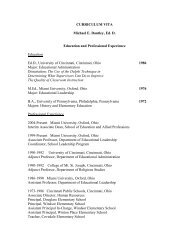Nabokov as Translator - units.muohio.edu
Nabokov as Translator - units.muohio.edu
Nabokov as Translator - units.muohio.edu
Create successful ePaper yourself
Turn your PDF publications into a flip-book with our unique Google optimized e-Paper software.
Vladimir <strong>Nabokov</strong>’s Translation and Commentary of Alexander Pushkin’s Eugene Onegin<br />
By Anna Dergatcheva<br />
instead of ‘it is’ or ‘that is.’ The signifiers of alliterations were also abandoned, although<br />
<strong>Nabokov</strong>’s ‘color reading’ (described in Conclusive Evidence’), <strong>as</strong> well <strong>as</strong> his love for<br />
anagramming, make alliterative plays extremely significant for his esthetics. Comp., e.g.,<br />
“I’ve decided to entitle the book [Mary] Mariette since I can’t stand the English ‘m<strong>as</strong>h’ in the<br />
transliteration of the Russian title.” - from a Letter to Frank Taylor, 1969, in Selected Letters,<br />
p. 459; also “For rendering precisely the rhythm of the [Maiden’s] Song, I’ve invented the<br />
following alliterative imitation, the meaning of which h<strong>as</strong>, of course, nothing to do with the<br />
illustrated lines (3-4): You’re the brightest, Davison, // You’re the lightest, Milligan. //<br />
Razygraites’, devitsy, // Razgulyaites’, milye!” - from Commentary, p. 340.<br />
11 Multiple examples are given by Boyd and other critics, I will contribute the following from<br />
Chapter 3, which w<strong>as</strong> chosen for the analysis here because of the re<strong>as</strong>ons intrinsic to Pushkin:<br />
(XI) “His style to a grave mood having attuned, // time w<strong>as</strong>, a flaming author // used to<br />
present to us his hero // <strong>as</strong> a model of perfection”; (XXIV) “Why is Tatiana, then, more<br />
guilty? // Is it because in dear simplicity //she does not know deceit // and in her chosen<br />
dream believes?” etc.<br />
12 From an Anonymous Interview, 1962.<br />
13 Commentary, p. 36.<br />
14 Commentary, p. 41.<br />
15 E.g., Commentary to Chapter 3, XXIIIa, which is a rejected stanza from the final draft:<br />
“This stanza is nothing more than a set of banalities, and Pushkin rejected it quite justly.”<br />
(Commentary, p. 315).<br />
16 Commentary, p. 36.<br />
17 The interesting comparison with the ‘strategically scientific’ interpretation would be, for<br />
example, Yury Lotman’s Commentary to EO.<br />
18 Lydia H. Liu, ed., Tokens of Exchange: The Problem of Translation in Global Circulations<br />
(Durham, NC: Duke University Press, 1999).<br />
19 The self-translations are the most relevant, since he practically rewrote the texts entirely,<br />
while transmitting them from/into Russian/English. A close reading of the two ‘variants’ of<br />
the same novel reveal not only minor semantic shifts, but also interpretative and conceptual<br />
ones, <strong>as</strong> in Camera Obscura, which he retitled Laughter in the Dark and substantially rewrote<br />
it. Another significant examples are the three versions of his autobiography: Conclusive<br />
Evidence (English), Drugie berega (Russian) and Speak, Memory (English). <strong>Nabokov</strong>’s early<br />
15


